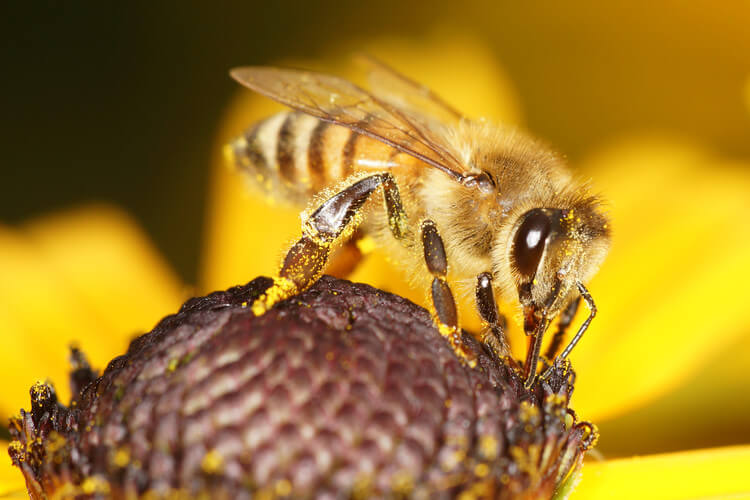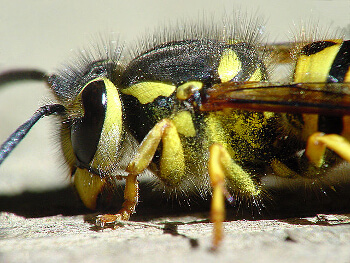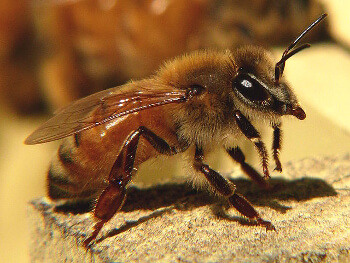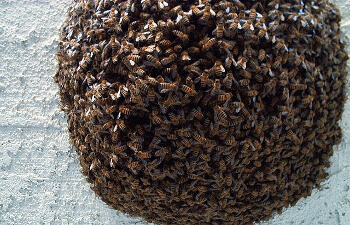Ricochet is the best place on the internet to discuss the issues of the day, either through commenting on posts or writing your own for our active and dynamic community in a fully moderated environment. In addition, the Ricochet Audio Network offers over 50 original podcasts with new episodes released every day.
 Ask the Expert: How I Learned to Stop Worrying and Love the Bees
Ask the Expert: How I Learned to Stop Worrying and Love the Bees

You’re afraid of this enterprising little lady? Seriously?
I should start this piece with a disclaimer: As far as beekeeping goes, I am a relative expert. This is only my second year of the hobby, which makes me a solid novice. However, beekeeping is an all-or-nothing commitment in that you either work with thousands of bees, or you don’t work with any. Most people fall into the latter category, so I can comfortably venture that — even as a novice — I’ve had more exposure to bees than most non-beekeepers will have in their lifetimes. On the other hand, I know that there is at least one other beekeeper on Ricochet, and she’s been at it about ten times as long as I. So, rather than focus on truly expert points, I will focus on points that a non-beekeper might find useful, specifically ones that show that honeybees, unlike wasps or hornets, aren’t all that scary.
Q: Aren’t honeybees aggressive like wasps or hornets?
A: Different strains have different levels of aggression, but on the whole, no. One of the most popular strains of honeybee is the Ligurian (or Italian), which is the strain of bees that the ancient Romans kept. It’s been domesticated for thousands of years and it shows.

Hi! I’m a Yellow Jacket. I’m a jerk.
Q: What does a honeybee look like, as opposed to a yellow jacket (wasp)?
A: Honeybees are smaller, browner, and are colored less brightly. Honeybees are also fuzzy; yellow jackets have some, but not a lot, of fuzz.
Q: If honeybees are not aggressive, why did one sting me?
A: If a honeybee stings, it is because it thinks that its life or its hive is threatened. Most people never come near a beehive, so the bee probably thought that its life was threatened. If a bee lands on you, don’t swat. Instead just watch, it will fly away on its own.
I have been stung only twice in two years and both times were my fault. The first time, there was a bee on the webbing of my thumb. I did not see it, closed my thumb, and squeezed the bee. The bee defended itself. The second time, I was inspecting the hive and one of the boxes fell to the ground. The bees thought, correctly, that their hive was threatened. So don’t threaten them, remain calm, and they most likely won’t sting you.
Q: Don’t honeybees die after they sting?
A: Yes, they do. Unlike wasps and hornets, honeybees have a barbed stinger: When used, the stinger is ripped out of its body and then it soon dies. So, unlike wasps and hornets, there is a cost for a honeybee to sting you. The honeybee instinctively knows this and will only sting if it thinks it must.

Hi! I’m a Honeybee. I’m fuzzy.
Q: Why do honeybees land on people?
A: Honeybees are foragers. They are looking for pollen, and sometimes they are looking for salt. Salt helps cure their honey. If a bee lands on you, it likely wants to lick off some salt and return to its hive. Not so threatening, right? If bees landing on you is a problem, buy a little salt wheel at a pet store and place it outside but protected from rain. The bees will eventually find it and begin to leave you alone.
Q: A honeybee landed on me and its stinger was twitching. That means that it was going to sting me, right?
A: No. What’s more, I think that this misunderstanding is the top reason why most people get stung by honeybees. Honeybees have a biology very different from that of mammals. Honeybees breathe through holes in their abdomens, which are sectioned and work like bellows. So when you see that a honeybee’s abdomen is pulsing, it’s merely breathing, not signaling aggression. So, don’t panic, don’t swat, and you won’t get stung.
Q: There are always bees around my swimming pool. Why?
A: Like every other living thing, bees need water. Check if there is an apiary nearby. If so, let the beekeeper know. He can set up an alternate water supply. Whether or not the bees will prefer the new supply over your pool is up to the bees.

Won’t you help the hiveless?
Q: There is a swarm of bees in my yard, What do I do?
A: First off, remain calm. Believe it or not, despite what over-hyped news stories or horror movies would have you think, honeybees are actually their most docile when swarming. Honeybees only swarm because their previous hive is no longer optimal. Usually, it is overpopulated. When they do swarm, they are looking for a new home. And since they have no home, they have no home to defend. And since they don’t want to set up a new home near threats, they will most likely avoid any threats. So, contact a local apiary. Honeybees are expensive. A beekeeper will gladly come out, adopt your swarm of no-cost bees, and remove them from your yard.
In just my short amount of time beekeeping, I can say that it is the most rewarding hobby I’ve taken up. Honeybees are very cool little creatures that you only begin to really appreciate once you start keeping them. The other reward is, of course, honey. Later today I will be prepping one of my hives for a harvest on Sunday. I expect to get about three gallons of wild sweet clover honey.
I am available for any beekeeping related questions you might have.
Are you a Ricochet member with an expertise of your own you’d like to share? See editor Tom Meyer’s post on how you can. Not a member? You can fix that here.
Published in Culture



Fascinating.
Looks delicious. Do you plan on selling any of it?
Cool, Rick.
In the picture where I am cutting wax, in the sink bay to my right, there is a black pot of hot water. I heat the knife in that when needed.
This batch, probably not. But in the future, yes.
We just finished bottling. My wife has been saving used glass jars, so some of them say things like “Tostitos.”
Appx. 344 Ounces – 2.6875 Gallons.
This has been truly fascinating – thanks for sharing!
Thanks for reading, Pugshot.